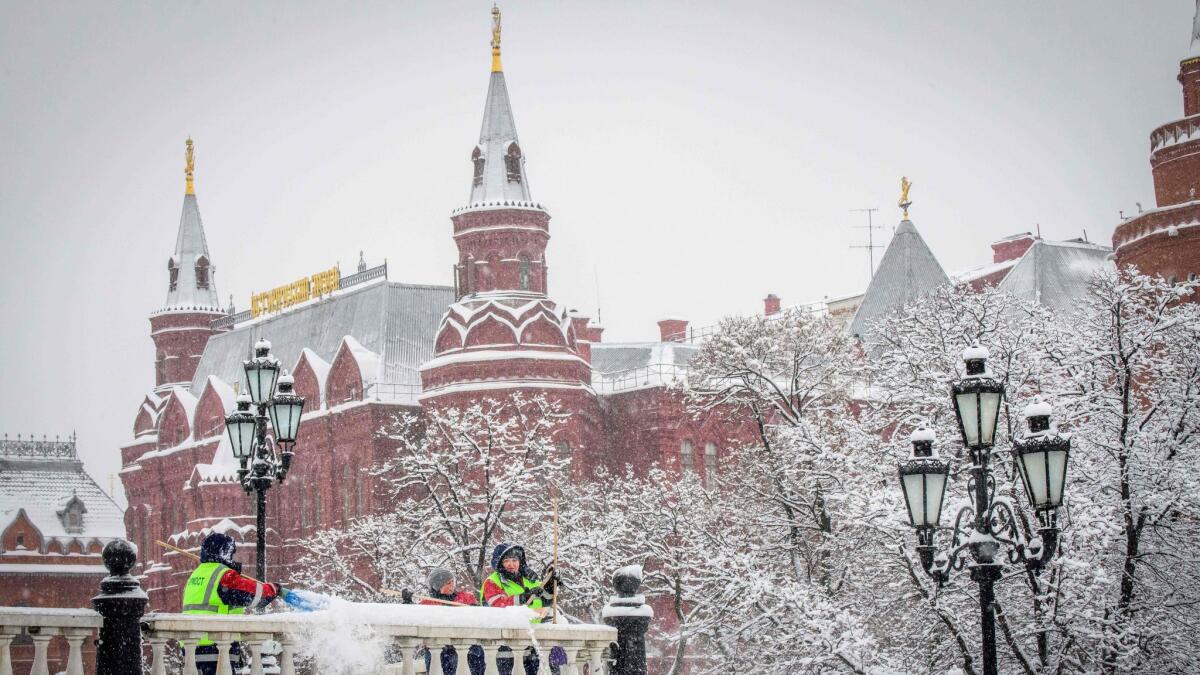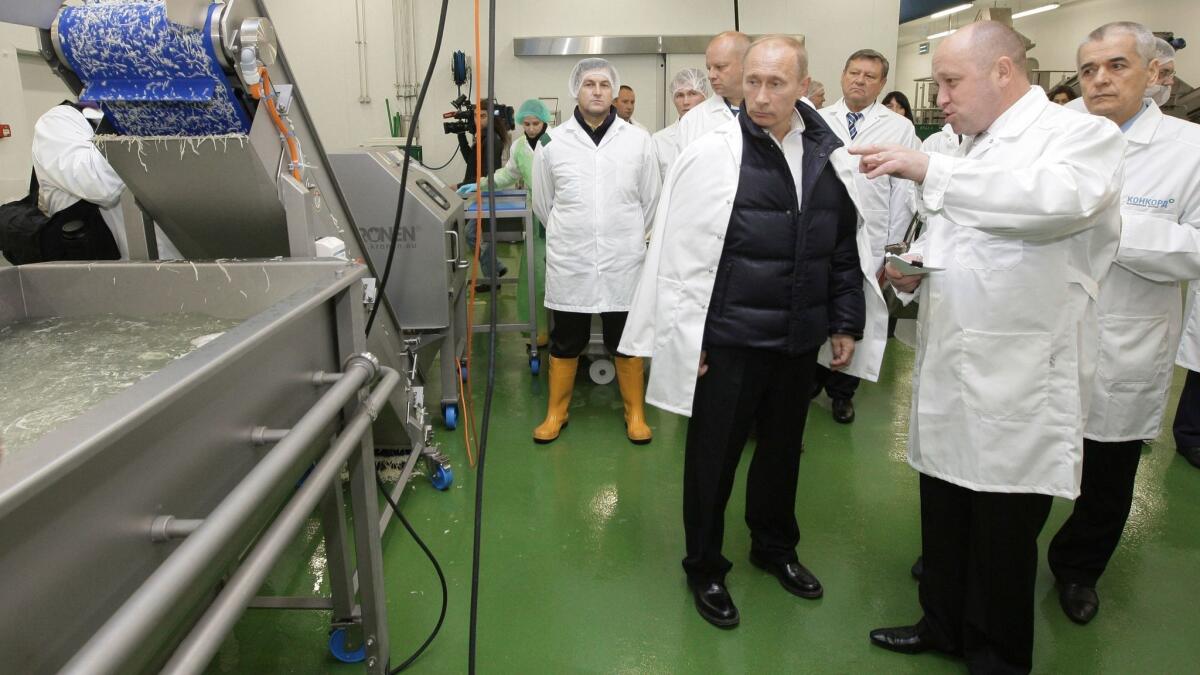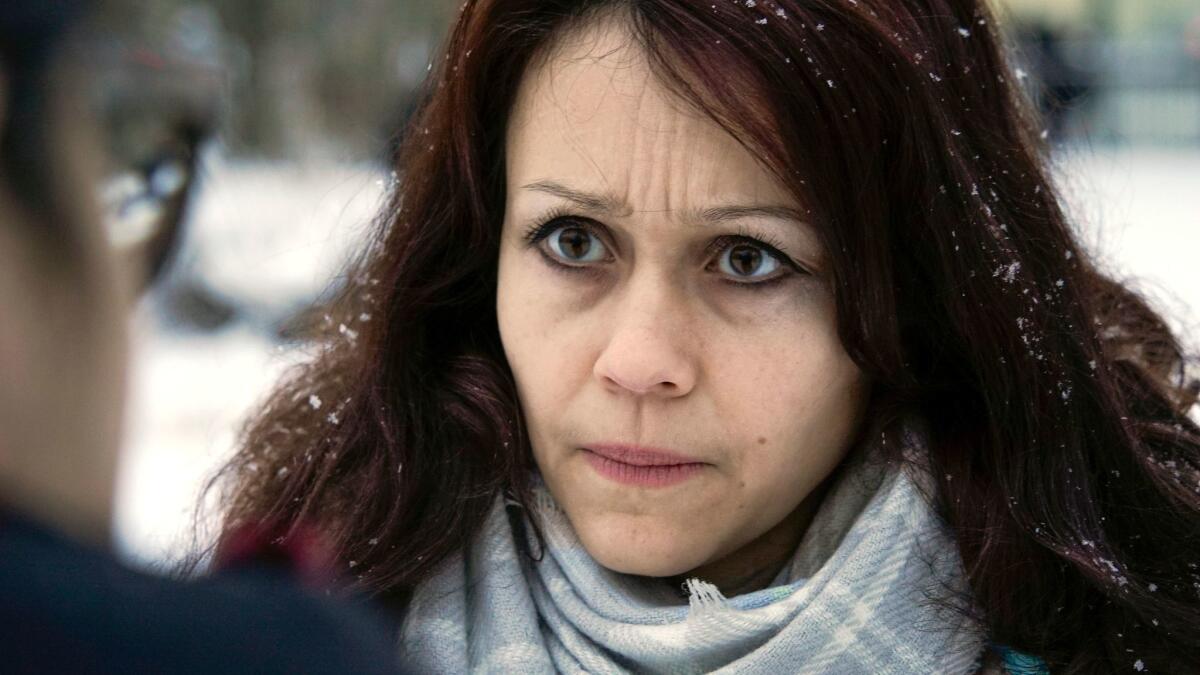Laughing? Not so much. Most Russians just wish the election-tampering story would go away

Russians aren’t laughing their anythings off.
The day after President Trump tweeted about Russians “laughing their asses off” in response to American investigations of tampering in the 2016 presidential election, the Kremlin on Monday reacted with a distinct lack of hilarity to the indictments of 13 Russians in connection with carrying out an illegal “information warfare” campaign.
For the record:
12:00 a.m. Feb. 19, 2018An earlier version of this article incorrectly spelled Fyodor Lukyanov’s surname as Lyukanov.
“First of all, we didn’t see any substantial evidence of someone interfering in their domestic affairs,” Kremlin spokesman Dmitry Peskov told reporters on a conference call. “We still insist such evidence lacks foundation.”
For many Russians, the U.S. accusations have simply become tiresome. Many dismiss the idea that their government could be powerful enough to weaken American democratic institutions.
The spokeswoman for the Ministry of Foreign Affairs reiterated this idea in a message posted to her Facebook account over the weekend.
“Thirteen individuals interfering in the U.S. election?” Maria Zakharova wrote. “Thirteen individuals versus the budgets of the security agencies that are measured in billions of dollars? Versus the intelligence, counterintelligence and top-notch technologies? Isn’t it absurd? Well, that’s the US political reality nowadays, you know.”
The Justice Department last week indicted 13 Russian nationals and three companies associated with a notorious “troll factory” in St. Petersburg called the Internet Research Agency. The indictments came as part of special prosecutor Robert S. Mueller III’s investigation into allegations of Russian meddling in the presidential election, accusations the Kremlin has vehemently denied.
The indictments charge the Russians with using social media platforms such as Facebook and Twitter to sow dissent within the American public in an attempt to disrupt the election in favor of Trump and against Democrat Hillary Clinton.
“We don’t think it’s fair and we can’t agree with it,” Peskov said. “Russia has never interfered, doesn’t have the habit of interfering in the domestic affairs of other countries, and is not doing it now.”
Vyacheslav Volodin, the speaker of Russia’s parliament, the Duma, sounded a bit like Trump when he said: “The party that lost the election [the Democrats] started accusing the Russian side of this instead of admitting its defeat.”
A close associate of Russian President Vladimir Putin, entrepreneur Yevgeny Prigozhin, is named in the indictment as the owner of the troll factory. The Russian press has nicknamed Prigozhin “Putin’s chef” because of his lucrative government catering contracts. He is believed to be the main financier behind the troll farm, which the indictment contends developed fake American personas online to spread misinformation.

In an interview with the Russian news agency Ria, Prigozhin said he was “not at all worried” about the indictments.
“Americans are very impressionable people, they see what they want to see. I treat them with great respect,” he said. “If they want to see the devil -- let them see him.”
With no formal extradition agreement between the United States and Russia, it is unlikely that those named in the indictment will ever face U.S. prosecution.
The Kremlin has said the investigations into allegations of Moscow meddling stem from a growing sense of “Russophobia” in Washington that is prohibiting attempts by Russia to improve relations between the former Cold War adversaries.
The Russian Embassy in London, known for its witty presence on social media, tweeted Monday that the attention paid in Western media to Russian influence in the U.S. election “makes one feel stalked.”
Over the weekend, Trump tweeted a barrage of messages, first saying the indictments proved there was “no collusion” between his campaign and the Kremlin and then saying: “If it was the GOAL of Russia to create discord, disruption and chaos within the U.S. then, with all of the Committee Hearings, Investigations and Party hatred, they have succeeded beyond their wildest dreams. They are laughing their asses off in Moscow. Get smart America!”
“Laughing — maybe it’s not exactly the right word,” said Fyodor Lukyanov, the editor-in-chief of Russia in Global Affairs. “The level of obsession with Russian menace in the U.S. is pretty scary now. The consequences might be very, very serious, as the relationship now is absolutely deadlocked.”
At this point, it’s very hard to see “how to get out of this deadlock,” he added.
Russian state media coverage of the indictments has been overshadowed by more pressing events of the week: The Olympic Athletes From Russia’s hockey team 4-0 win over the U.S. at the Pyeongchang Games and the start of Maslenitsa, a traditional celebration in which families gather together to feast on pancakes stuffed with sour cream and caviar before the start of Lent. The Florida school shooting also played prominently in the nightly news.
Many Russians have come to see the constant news stories about alleged Russian meddling in U.S. elections as simply rumors based on a return to Cold War paranoia.
“What do I think about this? I can only say that it is the internal political affairs of America, and Trump himself must deal with his citizens and with his authority among the people who elected him,” said Olga Piskareva, 48, a teacher in Moscow. “Trump creates PR around himself, but sanctions remain for us. It’s just politics.”
Still, Alexander Baunov, a senior fellow at the Carnegie Moscow Center, a think tank in Moscow, said the detailed charges in the 37-page indictment, which explain how the troll farm worked, are a game changer.
“Compared to what we had before, these accusations are much more detailed,” Baunov said. “We have moved past the political and media language and are now speaking in a legal language. There’s a difference.”
While many Russians would like the election-meddling topic to disappear, there is a vocal minority trying to bring attention to the corrosive nature of internet trolls and the effect of misinformation campaigns on the domestic audience as well.
One of the most vocal on this subject has been Lyudmila Savchuk, a former employee of the Internet Research Agency. Savchuk quit the troll farm, sued it for “moral damage” and won. She is now pushing a campaign with other Russian journalists, activists and legal experts to expose the troll farms’ activities.

Like Baunov, she sees the indictments as a step forward that could change some doubters’ minds in Russia.
“Those people who think critically and are trying to understand what is happening, they are serious about this threat [of troll factories],” Savchuk said in a phone interview. “On the other hand, there are people who are happy about the existence of such organizations because they believe that ‘Putin must be supported in such a difficult time for the country.’”
There are still those in Moscow who blame politicians for the repetitive cycle of Washington accusing the Kremlin of interference, and the Kremlin denying it, and see it as a humiliation for both sides.
“One can only sympathize with the Americans,” said Semyon Chikhlov, 37, an IT specialist in Moscow, about Trump’s barrage of tweets over the weekend. “Smart politicians do not talk about their problems in the country to the whole world. But Trump is right that with this case, they need to finish realizing the situation and resolve the issue.”
ALSO
Russia’s shadowy world of military contractors: independent mercenaries, or working for the Kremlin?
Twitter: @sabraayres
Ayres is a special correspondent.
More to Read
Start your day right
Sign up for Essential California for news, features and recommendations from the L.A. Times and beyond in your inbox six days a week.
You may occasionally receive promotional content from the Los Angeles Times.







